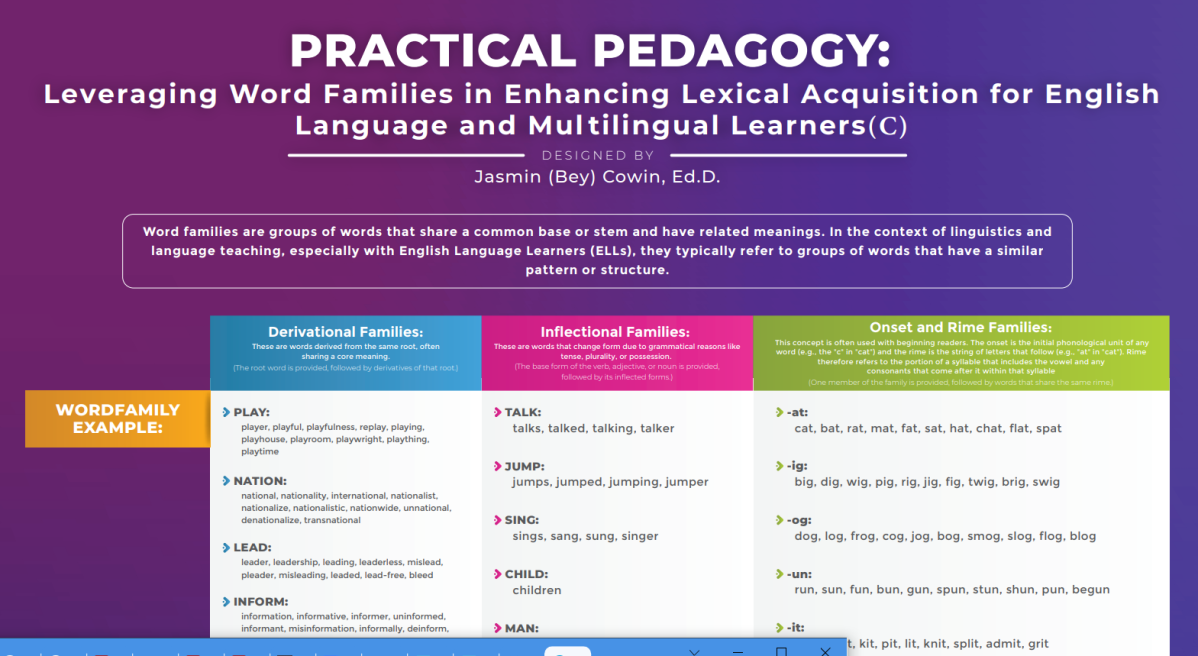My infographic “Practical Pedagogy: Leveraging Word Families in Enhancing Lexical Acquisition for English Language and Multilingual Learners” highlights the practical application of word families—clusters of words that originate from a shared root. These clusters provide a pragmatic strategy for vocabulary development, enabling more efficient Second Language Acquisition (SLA) for English learners. Through my infographic, I aim to equip educators with a clear, actionable guide on implementing explicit vocabulary teaching.
I hope my infographic serves as more than just an illustrative tool. I envision it as a practical spotlight on the tangible benefits of word families in enhancing language retention and comprehension for English Language Learners (ELLs). By having a visual guide on pedagogical implications on vocabulary aquisition and teaching, educators are better positioned to integrate word families into their lesson plans, thereby promoting enhanced vocabulary growth among their students, regardless of their linguistic backgrounds.
I hope my infographic “Practical Pedagogy: Leveraging Word Families in Enhancing Lexical Acquisition for English Language and Multilingual Learners”will serve more than just an illustrative purpose. I hope it will be a practical spotlight on the concrete benefits of word families in boosting language retention and comprehension. By understanding these pedagogical implications, teachers are better positioned to incorporate word families into their lesson plans, fostering enhanced vocabulary growth in their students, irrespective of their linguistic backgrounds.

Author: drcowinj
Dr. Jasmin (Bey) Cowin, Associate Professor at Touro University, Fulbright Scholar, SIT Graduate, past Education Policy Fellow (EPFP™) at Columbia University, Teachers College. At the heart of my professional journey is a commitment to transformative education, grounded in integrating concepts like Lynda Miller's philosophy of abundance, which counters Ruby Payne’s notion of a Culture of Poverty (2005). This philosophy emphasizes viewing experiences as assets filled with positivity and optimism, particularly valuable in an often dystopian-seeming world. My endeavors align closely with the United Nations Sustainable Development Goal 4: Quality Education, a goal deeply intertwined with both my personal and organizational objectives. This is evident in my work with initiatives such as Computers for Schools Burundi (CfSB), TESOL “Train the Trainer” programs in Yemen and Morocco, and my scholarly contributions including an article in the Journal of Higher Education Theory and Practice (JHETP) and various workshops focused on supporting displaced learners.
As an educator in the Fourth Industrial Revolution era, I recognize our crucial role in preparing the future workforce. To equip students with necessary digital literacy and technological skills, we educators must first master these areas. The technologies defining the 21st-century workforce could lead to new forms of exploitation if access is not globally democratized. By incorporating 4IR innovations in education, we shape students’ worldviews from an early age, preparing them for VUCA (Volatile, Uncertain, Complex, Ambiguous) environments and ensuring they become a skilled, adaptable workforce. In conclusion, my commitment extends beyond transactional interactions, focusing instead on utilizing my skills and privileges to make a positive, enduring impact on the world.
View all posts by drcowinj

